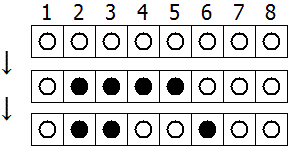This website is a semi-functional mirror of the original Project Euler. More information is available on GitHub.

Range flips
Problem 430
Published on 02 June 2013 at 07:00 am [Server Time]
N disks are placed in a row, indexed 1 to N from left to right.
Each disk has a black side and white side. Initially all disks show their white side.
At each turn, two, not necessarily distinct, integers A and B between 1 and N (inclusive) are chosen uniformly at random.
All disks with an index from A to B (inclusive) are flipped.
The following example shows the case N = 8. At the first turn A = 5 and B = 2, and at the second turn A = 4 and B = 6.

Let E(N, M) be the expected number of disks that show their white side after M turns.
We can verify that E(3, 1) = 10/9, E(3, 2) = 5/3, E(10, 4) ≈ 5.157 and E(100, 10) ≈ 51.893.
Find E(1010, 4000).
Give your answer rounded to 2 decimal places behind the decimal point.
Go to back to Problems